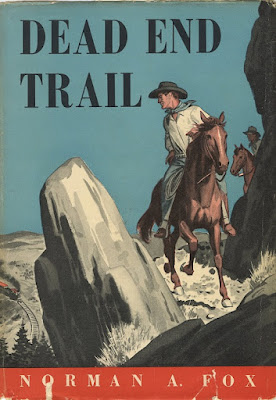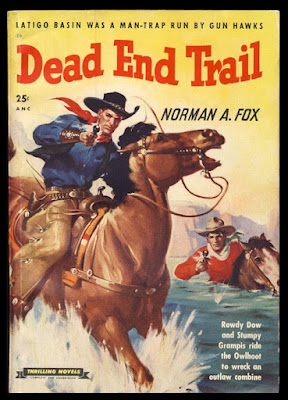Norman A. Fox was a prolific, consistently good Western author in both the pulps and the novel market for more than twenty years, from the late Thirties until his death in 1960. He published 31 novels during that time, as well as more than 400 stories, all of them Westerns except for one detective yarn. His most successful decade was probably the Fifties, when several of his novels were made into movies.
DEAD END TRAIL, published in hardcover by Dodd, Mead in 1944 and reprinted
several times in paperback, is the first of four novels featuring range
detectives Rowdy Dow and Stumpy Grampis, Fox’s only series characters. Actually, in this one the duo start out as reformed outlaws. Rowdy has received
a pardon for his crimes because he heroically risked his life to warn a whole
valley full of settlers when a dam burst, so they could escape before the
resulting flood washed them away. As the novel opens, the two friends are on
the drift in Montana, but they soon find themselves in trouble when a U.S.
marshal recruits them to help him on a mysterious errand: he wants Rowdy and
Stumpy to deliver a china figurine of a rearing stallion to a rancher in Latigo
Basin. This rouses Rowdy’s curiosity enough for him to go along with the plan.
Well, you know things are bound to get a lot more complicated than that. Turns
out the china figurine is the key to recovering a fortune in hidden loot. But
that’s not all. There’s a land swindle going on in Latigo Basin, plus a
legendary outlaw who’s escaped from prison (Butch Rafferty . . . Hmm, wonder
who he’s based on?), a dimwitted giant who can repeat, verbatim,
anything he’s ever been told, a county fair, a hot air balloon, some rustling,
and oh, yeah, a pretty girl. Fox mixes it all together into a pretty
complicated plot that changes direction several times. The story sprawls around
enough that I wondered if Fox came up with it by combining a couple of his pulp
stories, but that’s pure speculation on my part.
Whatever its origins, DEAD END TRAIL is a solid, entertaining traditional Western.
The pace is a little leisurely and there’s quite a bit of droll humor, but Fox can
bring the hardboiled action when he needs to. I don’t think it’s a coincidence
that Rowdy and Stumpy remind me quite a bit of Roy Rogers and Gabby Hayes, but
again, that’s pure speculation on my part. What I do know is that I enjoyed
this novel, and if you’re a fan of traditional Westerns, I think there’s a good
chance you will, too. The other Rowdy Dow and Stumpy Grampis novels are THE DEVIL'S SADDLE, THE FEATHERED SOMBRERO, and THE PHANTOM SPUR. With titles like those, you can bet there's a pretty good chance I'll be reading them sooner or later.




4 comments:
I remember reading this several years ago and enjoying it. Fox is a fine writer as were most of his contemporaries of the time.
How common would you say is the Reformed Criminal Hero (or heroes) in westerns? Did GUNSMOKE (more the radio show than the tv spinoff) help make this more common?
Common enough that it's certainly a recognizable standard plot in the genre. I don't know about GUNSMOKE, but I seem to recall that Frederick Faust said a lot of his Westerns were about a bad man turning good, a good man going bad, or both.
Yeah...I was thinking mostly that, if anything, the radio GUNSMOKE might've made that trope even more "acceptable" to casual readers of westerns, given how Dillon and Proudfoot both had somewhat criminal pasts, and the radio series reached a Lot of people who might not've read westerns too often before encountering adult western narrative via the series.
But, I think I could've put it less naively above, in the previous comment!
Post a Comment